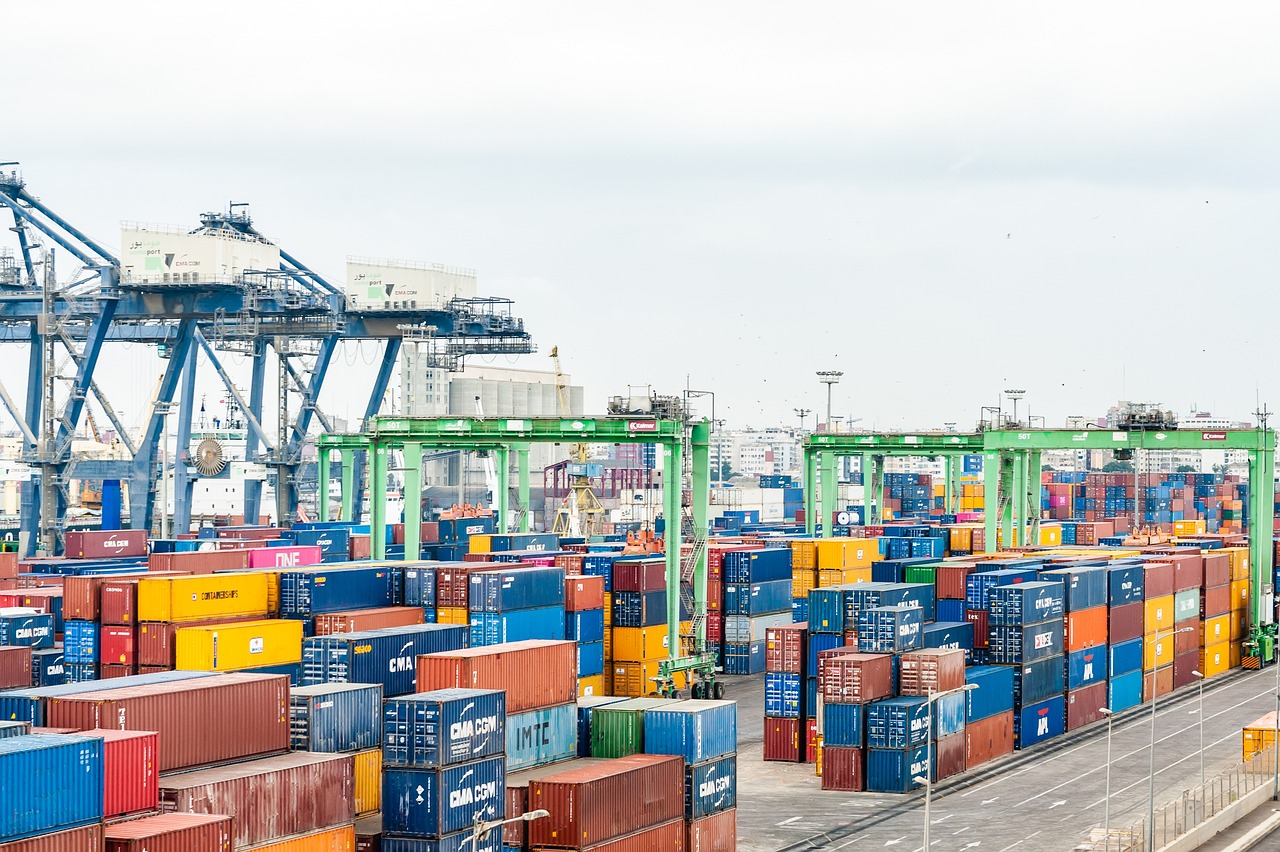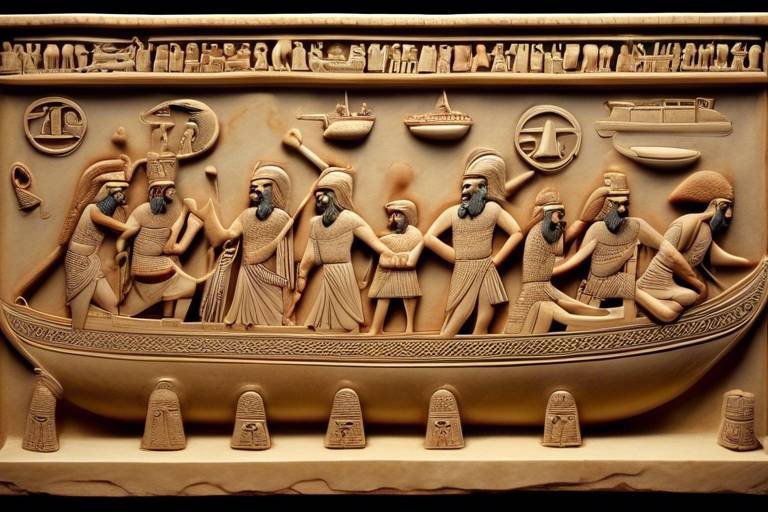The Enigma of the Ancient Phoenicians' Influence on Trade
The ancient Phoenicians have long been a subject of fascination and mystery when it comes to their profound influence on trade. Their enigmatic legacy in maritime commerce continues to intrigue historians, archaeologists, and scholars alike. Delving into the annals of history, one uncovers a rich tapestry of cultural exchange, technological innovation, and economic prowess that shaped the ancient world.
Originating from the coastal regions of the eastern Mediterranean, the Phoenicians emerged as a dominant maritime power during antiquity. Their city-states, notably Tyre and Sidon, flourished as bustling hubs of trade and industry. Interactions with neighboring civilizations such as the Egyptians and Greeks further enriched their cultural heritage and commercial networks.
One of the most remarkable aspects of Phoenician civilization was their extensive trade routes and networks that spanned across the known world. Navigating the waters of the Mediterranean, Red Sea, and even venturing into the Atlantic Ocean, they traded in a variety of goods including textiles, metals, and exotic luxury items. The strategic locations of their ports strategically positioned them as key players in the ancient trade landscape.
The impact of Phoenician commerce reverberated far and wide, influencing economies and societies across the ancient world. Their trading colonies, most notably Carthage, served as vital outposts for the exchange of goods and ideas. By facilitating international commerce and cultural exchange, the Phoenicians played a pivotal role in shaping the interconnectedness of the ancient world.
Through their maritime endeavors, the Phoenicians became conduits of cultural exchange and technological advancements. The diffusion of knowledge in shipbuilding, navigation techniques, and writing systems catalyzed advancements in ancient trade practices. Their innovative spirit laid the groundwork for future generations of seafaring cultures and global trade networks.
Archaeological evidence provides a tangible glimpse into the world of Phoenician trade, with discoveries of shipwrecks, artifacts, inscriptions, and ancient ports offering valuable insights. These findings shed light on their commercial activities, trading practices, and the intricate web of cultural interactions that characterized Phoenician trade networks.
Modern perspectives on Phoenician trade continue to evolve as scholars delve deeper into the complexities of their commercial networks. The significance of their economic influence in the broader context of global history is a subject of ongoing debate and research. By unraveling the mysteries of Phoenician trade, we gain a deeper understanding of the forces that shaped the ancient world.
As ongoing research initiatives and archaeological discoveries shed new light on the legacy of Phoenician trade, our appreciation for their enduring impact on commerce continues to grow. The enigma of the ancient Phoenicians' influence on trade remains a captivating journey into the heart of maritime history, where the echoes of their legacy resonate across time and space.

Historical Significance of the Phoenicians
The historical significance of the Phoenicians is a captivating tale that unfolds through the annals of time, revealing a civilization shrouded in mystery and intrigue. Originating from the eastern Mediterranean region, the Phoenicians emerged as a maritime power during the early first millennium BCE. Their influence extended far and wide, leaving an indelible mark on the ancient world.
The Phoenicians, known for their seafaring prowess and commercial acumen, played a pivotal role in shaping the landscape of ancient trade and commerce. Rising from humble beginnings, they established flourishing city-states like Tyre and Sidon, which served as bustling hubs of economic activity and cultural exchange. Interactions with civilizations such as the Egyptians and Greeks enriched their own cultural tapestry, fostering a vibrant cross-pollination of ideas and practices.
The Phoenicians' adeptness in maritime navigation and trade not only secured their own prosperity but also paved the way for the development of extensive trade networks that spanned the Mediterranean, Red Sea, and even reached the distant shores of the Atlantic Ocean. Their strategic positioning along key trade routes enabled them to trade in a diverse array of goods, including textiles, metals, and luxurious items coveted by elites across the ancient world.
Moreover, the Phoenicians' commercial ventures extended beyond mere economic transactions; they were instrumental in fostering cultural exchange and technological advancements. Through their trade expeditions, they facilitated the diffusion of ideas, knowledge, and innovations, particularly in areas such as shipbuilding, navigation techniques, and the dissemination of early writing systems.
The legacy of the Phoenicians in maritime trade endures to this day, as their expertise in seafaring and commerce laid the foundation for subsequent civilizations to thrive on the high seas. Their influence reverberated through the annals of history, shaping the development of navigation practices, trade routes, and global economic networks that underpin modern commerce.
Archaeological excavations have unearthed a treasure trove of evidence attesting to the Phoenicians' extensive commercial activities. Discoveries ranging from shipwrecks laden with trade goods to inscriptions and artifacts found in ancient ports offer valuable insights into their trading practices, economic endeavors, and cultural interactions with diverse societies.
Modern perspectives on Phoenician trade shed light on the enduring significance of their commercial networks in the broader context of global economic history. Scholars continue to debate and analyze the impact of Phoenician trade routes on the evolution of commerce, offering new insights into the dynamics of ancient trade and its far-reaching consequences.
Ongoing research initiatives and archaeological projects are unraveling fresh discoveries that deepen our understanding of Phoenician trade networks and practices. These endeavors not only illuminate the past but also underscore the enduring legacy of the Phoenicians in the annals of maritime trade and commerce.

Phoenician Trade Routes and Networks
The Phoenicians were renowned for their extensive trade routes and networks that spanned across the ancient world, connecting various regions and cultures through maritime commerce. These seafaring merchants established a vast network of trading ports and routes that facilitated the exchange of goods, ideas, and technologies.
One of the key trade routes of the Phoenicians was the Mediterranean Sea, where they navigated between their major city-states such as Tyre, Sidon, and Byblos, and other significant trading hubs in the region. The Phoenicians also ventured beyond the Mediterranean, reaching as far as the Red Sea and the Atlantic Ocean, establishing trade links with distant lands.
Through these trade routes, the Phoenicians transported a wide array of goods, including textiles, precious metals, ivory, glassware, and exotic luxury items. Their strategic positioning along major waterways allowed them to control the flow of trade and dominate commercial activities in the ancient world.
Furthermore, the Phoenicians' trade networks extended inland, connecting coastal cities to interior regions through overland trade routes. This integration of maritime and land-based trade routes enabled the Phoenicians to establish a comprehensive trading network that influenced economies and cultures far beyond their own territories.
Moreover, the Phoenicians' mastery of navigation and shipbuilding techniques played a crucial role in the success of their trade networks. Their innovative use of sails, navigation instruments, and seafaring knowledge allowed them to navigate treacherous waters and explore new territories, expanding their trade routes and networks.
In essence, the Phoenician trade routes and networks were not merely conduits for the exchange of goods but also served as channels for cultural interaction, technological diffusion, and economic prosperity, shaping the ancient world and leaving a lasting legacy in the annals of maritime history.
For more information about the Phoenicians' trade routes and networks, delve into the historical accounts, archaeological findings, and scholarly research that illuminate the fascinating world of ancient Phoenician commerce.

Impact of Phoenician Commerce
Topics to be discussed in the article include the historical significance of the Phoenicians, their trade routes, impact on commerce, cultural exchange, technological advancements, legacy in maritime trade, archaeological evidence, modern perspectives, and ongoing research.
Exploring the origins and rise of the Phoenician civilization, their role in the ancient world, development of city-states like Tyre and Sidon, and interactions with other civilizations such as the Egyptians and Greeks.
Investigating the extensive maritime trade routes established by the Phoenicians, connections to regions like the Mediterranean, Red Sea, and Atlantic Ocean, trade goods such as textiles, metals, and luxury items, and the strategic locations of their ports.
Examining the economic influence of Phoenician trade on the ancient world, the spread of goods and ideas, establishment of trading colonies like Carthage, and their role in facilitating international commerce and cultural exchange.
Discussing the cultural diffusion facilitated by Phoenician trade, the exchange of knowledge in areas such as shipbuilding, navigation, and writing systems, and the technological innovations that revolutionized ancient trade practices.
Analyzing the enduring impact of Phoenician maritime expertise on subsequent civilizations, the influence on seafaring cultures, navigation techniques, and the development of global trade networks that shaped world history.
Reviewing archaeological discoveries related to Phoenician trade, including shipwrecks, artifacts, inscriptions, and ancient ports, providing insights into their commercial activities, trading practices, and cultural interactions.
Exploring how modern scholars interpret the Phoenicians' role in ancient trade, the significance of their commercial networks in understanding global economic history, and the ongoing debates surrounding their impact on trade routes and commerce.
Highlighting current archaeological projects, research initiatives, and discoveries that continue to expand our understanding of Phoenician trade networks, trade practices, and their enduring legacy in the history of commerce.
The impact of Phoenician commerce reverberated throughout the ancient world, shaping economies and fostering cultural exchange on a grand scale. Through their extensive trade networks, the Phoenicians not only facilitated the exchange of goods but also served as conduits for the flow of ideas and innovations. Their establishment of trading colonies, most notably Carthage, solidified their economic influence and paved the way for future commercial endeavors. The Phoenicians' role in international commerce not only enriched their own civilization but also left a lasting imprint on the trade practices of civilizations that followed.
Stay tuned for the FAQ section!

Cultural Exchange and Technological Advancements
When delving into the historical tapestry of the Phoenicians, one cannot overlook the profound impact they had on cultural exchange and technological advancements. Imagine a bustling marketplace where not only goods but also ideas were traded like precious commodities. The Phoenicians, with their far-reaching trade networks, served as conduits for the exchange of knowledge and innovation across the ancient world.
Picture a Phoenician vessel navigating the vast expanse of the Mediterranean, laden not only with valuable cargo but also with the seeds of technological progress. Through their interactions with diverse civilizations, the Phoenicians absorbed and disseminated advancements in shipbuilding, navigation techniques, and writing systems. Like skilled artisans, they wove these strands of knowledge into the fabric of their society, creating a tapestry of cultural fusion.
As the Phoenicians plied the seas, they carried not just goods but also the tools of progress. Their ships, renowned for their seaworthiness and speed, became floating laboratories where ideas from distant lands mingled and sparked new innovations. The exchange of maritime technology was not merely a transaction of goods but a dialogue of civilizations, each contributing to the collective pool of human ingenuity.
One cannot overlook the Phoenicians' role as pioneers in the realm of commerce and culture. Their alphabet, a revolutionary system of writing, spread far and wide, becoming the foundation for numerous scripts used in the ancient world. This dissemination of literacy was not just a means of communication but a catalyst for intellectual exchange, fostering a climate of learning and innovation.
It is through the lens of cultural exchange and technological advancements that we can truly appreciate the legacy of the Phoenicians. They were not just traders of goods but ambassadors of ideas, bridging the gaps between civilizations and laying the groundwork for the interconnected world we inhabit today.

Legacy of the Phoenicians in Maritime Trade
The legacy of the Phoenicians in maritime trade is a testament to their unparalleled expertise and lasting impact on global commerce. Through their pioneering efforts in seafaring, navigation, and trade networks, the Phoenicians laid the foundation for future civilizations to thrive on the seas. Their legacy can be seen in the development of advanced navigation techniques, the establishment of strategic trading outposts, and the diffusion of maritime knowledge across the ancient world.
One remarkable aspect of the Phoenician legacy is their influence on seafaring cultures beyond their time. By mastering the art of sailing and exploring distant lands, the Phoenicians inspired generations of sailors and traders to venture into uncharted waters. Their innovative ship designs and navigational skills set a standard for maritime excellence that reverberated throughout history, shaping the course of trade routes and connecting distant civilizations.
Moreover, the Phoenicians' legacy in maritime trade extended to the establishment of global trade networks that facilitated the exchange of goods, ideas, and cultures. Their strategic positioning along key trade routes enabled them to dominate commercial activities in the ancient world, fostering a vibrant exchange of commodities such as textiles, spices, precious metals, and exotic goods. This network of trade paved the way for economic prosperity and cultural enrichment, leaving a lasting imprint on the history of commerce.
Archaeological evidence further corroborates the enduring legacy of Phoenician maritime trade. Discoveries of ancient shipwrecks, trade goods, and maritime infrastructure offer valuable insights into the scale and sophistication of Phoenician commercial activities. These artifacts not only provide a glimpse into the material wealth amassed through trade but also shed light on the intricate web of maritime connections that defined the Phoenician trading empire.
In essence, the legacy of the Phoenicians in maritime trade transcends mere economic prosperity; it symbolizes a spirit of exploration, innovation, and cultural exchange that continues to inspire scholars and historians to this day. By unraveling the mysteries of Phoenician trade routes and maritime achievements, we gain a deeper appreciation for the pivotal role they played in shaping the course of world history and laying the groundwork for future maritime endeavors.

Archaeological Evidence of Phoenician Trade
When delving into the archaeological evidence of Phoenician trade, we uncover a treasure trove of artifacts and remnants that provide valuable insights into their commercial activities and cultural interactions. Excavations of ancient ports like Byblos and Sidon have unearthed remnants of Phoenician ships, showcasing their advanced shipbuilding techniques and seafaring prowess. These well-preserved vessels offer a glimpse into the maritime expertise of the Phoenicians and their mastery of navigating the treacherous waters of the Mediterranean.
Furthermore, the discovery of Phoenician artifacts in distant lands such as Spain, Sicily, and Sardinia attests to the extensive reach of their trade networks. These findings not only highlight the breadth of Phoenician commerce but also shed light on the exchange of goods and ideas that occurred along their trade routes. Inscriptions on pottery, coins, and other objects provide clues about the trade routes, trade partners, and economic activities of the Phoenicians, painting a vivid picture of their bustling commercial endeavors.
In addition to physical artifacts, the study of ancient shipwrecks has been instrumental in piecing together the puzzle of Phoenician trade. The recovery of cargoes laden with precious metals, ceramics, and exotic goods from sunken Phoenician vessels offers a glimpse into the types of commodities traded by these ancient mariners. These underwater archaeological sites serve as time capsules, preserving a snapshot of Phoenician trade practices and the goods that traversed the ancient seas.
Moreover, the presence of Phoenician inscriptions and dedicatory offerings in prominent trading hubs like Carthage and Motya provides evidence of their establishment of trading colonies and commercial outposts. These inscriptions not only serve as markers of Phoenician presence but also offer valuable clues about their interactions with local populations and the cultural exchange that took place in these bustling centers of commerce.
Overall, the archaeological evidence of Phoenician trade paints a vivid picture of a maritime civilization that thrived on commerce, cultural exchange, and technological innovation. Through the excavation of ancient ports, study of shipwrecks, and analysis of artifacts, archaeologists continue to unravel the mysteries of Phoenician trade networks and their lasting impact on the ancient world.

Modern Perspectives on Phoenician Trade Influence
Topics to be discussed in the article include the historical significance of the Phoenicians, their trade routes, impact on commerce, cultural exchange, technological advancements, legacy in maritime trade, archaeological evidence, modern perspectives, and ongoing research.
Exploring the origins and rise of the Phoenician civilization, their role in the ancient world, development of city-states like Tyre and Sidon, and interactions with other civilizations such as the Egyptians and Greeks.
Investigating the extensive maritime trade routes established by the Phoenicians, connections to regions like the Mediterranean, Red Sea, and Atlantic Ocean, trade goods such as textiles, metals, and luxury items, and the strategic locations of their ports.
Examining the economic influence of Phoenician trade on the ancient world, the spread of goods and ideas, establishment of trading colonies like Carthage, and their role in facilitating international commerce and cultural exchange.
Discussing the cultural diffusion facilitated by Phoenician trade, the exchange of knowledge in areas such as shipbuilding, navigation, and writing systems, and the technological innovations that revolutionized ancient trade practices.
Analyzing the enduring impact of Phoenician maritime expertise on subsequent civilizations, the influence on seafaring cultures, navigation techniques, and the development of global trade networks that shaped world history.
Reviewing archaeological discoveries related to Phoenician trade, including shipwrecks, artifacts, inscriptions, and ancient ports, providing insights into their commercial activities, trading practices, and cultural interactions.
In modern times, scholars view the Phoenicians as pioneers of international trade, laying the foundation for future economic systems. Their strategic positioning along key trade routes allowed for the exchange of goods and ideas across vast distances, shaping the interconnected world we live in today. The Phoenicians' emphasis on maritime trade and establishment of trading outposts set a precedent for global commerce, influencing trade practices for generations to come.
Highlighting current archaeological projects, research initiatives, and discoveries that continue to expand our understanding of Phoenician trade networks, trade practices, and their enduring legacy in the history of commerce.
Stay tuned for the FAQ section!

Ongoing Research and Discoveries
Ongoing Research and Discoveries in the field of Phoenician trade continue to shed light on the complexities of their maritime networks and commercial activities. Archaeological excavations in key Phoenician trading hubs like Carthage and Byblos have unearthed valuable artifacts and inscriptions that provide insights into their trading practices and cultural interactions. Researchers are meticulously analyzing these findings to piece together the puzzle of Phoenician trade routes and the extent of their influence on ancient commerce.
Moreover, ongoing studies are delving into the technological advancements of the Phoenicians, particularly in shipbuilding and navigation. By examining ancient shipwrecks and maritime infrastructure, experts aim to unravel the secrets of Phoenician seafaring expertise and its impact on the development of maritime trade in the ancient world. Through interdisciplinary research approaches, scholars are connecting the dots between archaeological evidence and historical accounts to paint a comprehensive picture of Phoenician trade networks.
Furthermore, modern scientific techniques such as remote sensing and isotopic analysis are revolutionizing the study of Phoenician trade. By utilizing cutting-edge technology, researchers can map ancient trade routes, trace the origins of traded goods, and uncover hidden details of Phoenician commercial activities. These innovative methods are enabling a deeper understanding of the scope and dynamics of Phoenician trade, challenging previous assumptions and opening new avenues for exploration.
Collaborative efforts between archaeologists, historians, and marine scientists are pushing the boundaries of knowledge regarding Phoenician trade practices. By combining expertise from various disciplines, researchers are able to construct a more nuanced narrative of Phoenician commerce, highlighting the interconnected nature of ancient trade systems and the enduring legacy of the Phoenicians in shaping global economic networks. As ongoing research continues to unveil new discoveries, the enigma of the Phoenicians' influence on trade becomes ever more intriguing and multifaceted.
Frequently Asked Questions
- What were the main trade goods exchanged by the Phoenicians?
The Phoenicians were renowned for trading a variety of goods, including textiles, metals such as copper and tin, exotic spices, precious stones, and luxury items like glassware and ivory.
- How did Phoenician trade routes influence ancient commerce?
Phoenician trade routes played a crucial role in connecting different regions, facilitating the exchange of goods, ideas, and cultural practices. Their networks contributed to the growth of international commerce and cultural diffusion in the ancient world.
- What was the significance of Phoenician ports in their trade activities?
Phoenician ports, strategically located along key maritime routes, served as vital hubs for trade operations. Cities like Tyre and Sidon were major centers of commerce, enabling the Phoenicians to establish strong trading relationships with distant civilizations.
- How did Phoenician shipbuilding techniques influence maritime trade?
The Phoenicians were pioneers in developing advanced shipbuilding techniques, such as the construction of sturdy wooden vessels like the galley and the use of sails for navigation. These innovations revolutionized ancient maritime trade and enabled them to navigate vast distances across the seas.
- What evidence supports the legacy of Phoenician trade in modern times?
Archaeological discoveries, including shipwrecks, artifacts, and inscriptions, provide tangible evidence of Phoenician trade activities. The legacy of their maritime expertise can be seen in the development of navigation methods, trade routes, and global commerce systems that continue to influence trade practices today.



















